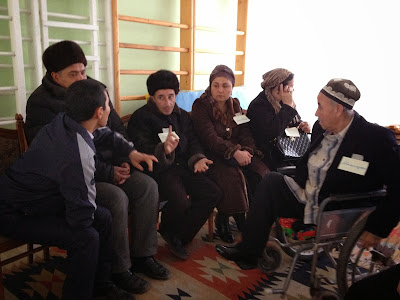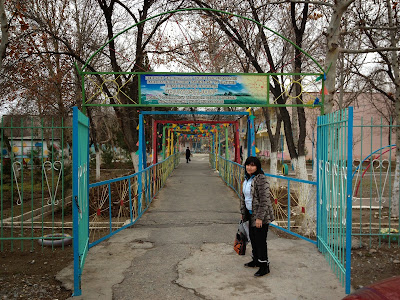昨日、12月21日(土)にまた風の強い街ベコボッド市でDETトレーニングが行われました。今回は、ベコボッド地区ではなくベコボッド市でDETを実施しました。ベコボッド市はベコボット地区から約20キロに位置しています、タシケント市からは160キロぐらいです。
Yesterday, on December 21 (Saturday) one more DET training was conducted in the city of strong wind - Bekobod. This time, it was not in Bekobod district, but in Bekobod city itself, where DET was held. Bekobod city is located at around 20 km away from the district, and from Tashkent city approx. 160 km.
トレーニングを開始する準備をしている時に、私は大野さんに「停電がないといいですね」と言いました。しかし、私の希望はあえなく打ち砕かれました。電気はトレーニング開始前に切断され、ノートパソコンでプレゼンテーションを見せなくてはなりませんでした。
At the time when we were preparing to start the training, I told Ohno san "I hope there will be no electricity cut-offs". However, my hopes were all dead, and the electricity was suddenly cut off, so we had to show the presentation on the notebook.
ムハバットさんの最初の質問は、「すべての障害者を健常者にするべき、という考え方に同意しますか」。その質問に、すべての参加者が、障害者の方が完全に社会に参加するためには、彼らをリハビリテーションする必要がある、と回答しました。これは障害の医学モデルの観点からは正解ですね。ムハバットさんは「もちろん、リハビリテーションは必要ですが、医学的リハビリテーションは、障害の種類によって、効果がない場合もありますね」と追加しました。リハビリをしても「健常者」にすることが出来ない障害者の方は、完全に社会に参加することが出来ないと言うことなのでしょうか、と問いかけました。
The first question asked by Mukhabbat was "Should we make all disabled people normal?" To which all the participants answered that the rehabilitation is necessary to make people with disabilities normal in order for them to fully participate in society. A good answer from the perspective of the medical model of disability. However, Mukhabbat added that of course rehabilitation is needed, but there are cases that the medical rehabilitation can't be done or can be done only to some extent, depending on the type of impairment. So that means that those whom we can't make 'normal' can't fully participate in the society?
Yesterday, on December 21 (Saturday) one more DET training was conducted in the city of strong wind - Bekobod. This time, it was not in Bekobod district, but in Bekobod city itself, where DET was held. Bekobod city is located at around 20 km away from the district, and from Tashkent city approx. 160 km.
 |
| 「亀さんグループ」のリーダー、ムハバットさんがファシリテーター、サフィヤさんが副ファシリテーターでした。 The leader of self-help group 'Istiqbol' Mukhabbat was the main facilitator, while Safiya was the co-facilitator. |
トレーニングを開始する準備をしている時に、私は大野さんに「停電がないといいですね」と言いました。しかし、私の希望はあえなく打ち砕かれました。電気はトレーニング開始前に切断され、ノートパソコンでプレゼンテーションを見せなくてはなりませんでした。
At the time when we were preparing to start the training, I told Ohno san "I hope there will be no electricity cut-offs". However, my hopes were all dead, and the electricity was suddenly cut off, so we had to show the presentation on the notebook.
ムハバットさんの最初の質問は、「すべての障害者を健常者にするべき、という考え方に同意しますか」。その質問に、すべての参加者が、障害者の方が完全に社会に参加するためには、彼らをリハビリテーションする必要がある、と回答しました。これは障害の医学モデルの観点からは正解ですね。ムハバットさんは「もちろん、リハビリテーションは必要ですが、医学的リハビリテーションは、障害の種類によって、効果がない場合もありますね」と追加しました。リハビリをしても「健常者」にすることが出来ない障害者の方は、完全に社会に参加することが出来ないと言うことなのでしょうか、と問いかけました。
The first question asked by Mukhabbat was "Should we make all disabled people normal?" To which all the participants answered that the rehabilitation is necessary to make people with disabilities normal in order for them to fully participate in society. A good answer from the perspective of the medical model of disability. However, Mukhabbat added that of course rehabilitation is needed, but there are cases that the medical rehabilitation can't be done or can be done only to some extent, depending on the type of impairment. So that means that those whom we can't make 'normal' can't fully participate in the society?
 |
| 他の参加者トゥルキさんは、星の真中を押すと箱の中に無理に入れることが出来ると言うアイデアを提案しました。 Another participant Tulkin proposed the idea of pressing the center of the star and inserting it by force into the box. |
 |
| 第二セッションのグループディスカッション「ベコボッド市の障害者のための行動計画」 Second session's group discussion: "Plan of action for the disabled people in Bekobod city". |
 |
| ムハバットさんは、自分の携帯電話でちゃんとタイムマネジメントをしていました。 Mukhabbat did the time management with her mobile phone. |
 |
| グループ写真 Group photo |
最後に、ムハバットさんが「障害について、自分の意見が変わりましたか?」と言う質問をすべての参加者に聞きました。しかし、また神様と関係のある答えが出て来て、やはり宗教に関する意見を変えることは非常に困難であると私には思えました。それでも、参加者が少しでも、障害は個人の障害だけでなく、私たちの社会の中にある多くの障壁との関係もあると理解してくれたらいいなと思います。私たちは、箱の中に星を入れるためには、星の形を変化させないで、逆に箱の穴をもっと大きくしなければならない。言い換えれば、障害者を社会のために作り変えないで、逆に社会を障害者のニーズに適合させる必要があります。星は、本質的に美しいですから...
Finally, when Mukhabbat asked the participants if their opinion concerning disability was changed or not, there were again the answers related to God. Apparently, it is very difficult to change the minds when it concerns religion. However, I hope that many understood that disability is not only about personal impairments but also about the barriers prevailing in our society. We should not deform the star to put it into the box, but we should make the hole of the box bigger. In other words, we should not adapt disabled people to the society, but the society should be adapted to the needs of disabled people. The stars are beautiful by nature...
文責:ムラト
Edited by Ohno














.jpg)
.jpg)

.jpg)
.jpg)
.jpg)

.jpg)
.jpg)
.jpg)
.jpg)
.jpg)
.jpg)
.jpg)
.jpg)

.jpg)
.jpg)
.jpg)
.jpg)
.jpg)
.jpg)
.jpg)
.jpg)
.jpg)
.jpg)
